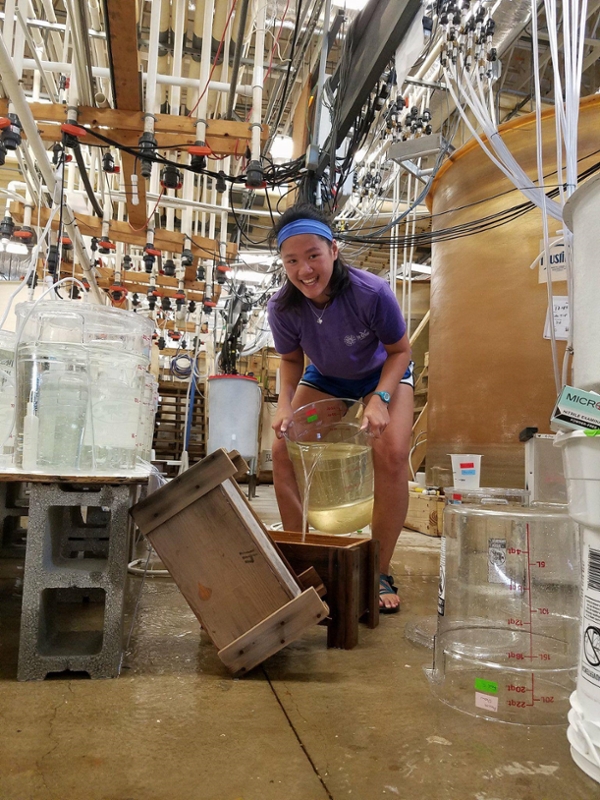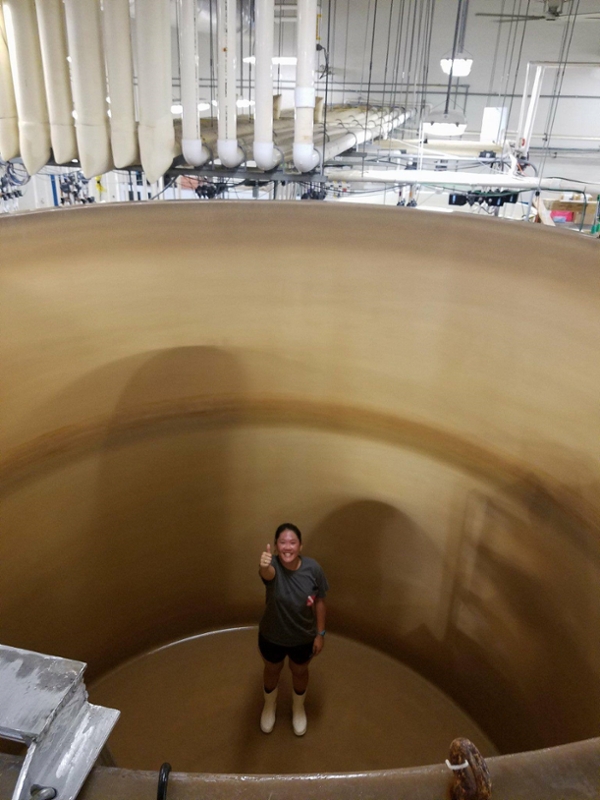TAMUG Student Riding a Wave of Success
Energy and enthusiasm; two traits that make a person stand out in life. Most people need a gallon of coffee in the morning to scrape together some of either. That’s not the case with Texas A&M University at Galveston student Michelle Nguyen.
A marine biology student pursuing a double-minor in diving and oceanography, Nguyen has hit the ground running in her final year at TAMUG, despite the fact that she got zero rest over the summer. Nguyen spent 12 weeks as a National Science Foundation (NSF) Research Experiences for Undergraduates (REU) fellow at the University of Maryland Center for Environmental Science program, based at the Horn Point Laboratory in Cambridge, Maryland.
The program is extremely competitive. Of the 350 applicants, only 17 were selected to participate. “The program wanted to have lots of diversity in order to foster a uniquely collaborative environment” Nguyen explained. “I was one of two people that came from a genuine Marine Biology program like what we have here at Galveston.”
Nguyen’s focus at Horn Point was in investigating the potential effects of hatchery conditions on oyster restoration. This study was unique in that it sought to understand the effects of hatchery conditions on the success of oyster larvae, along with any changes to the oysters’ durability.
Though her background was with phytoplankton, Nguyen feels lucky. “I was fortunate to work with Dr. Katherine McFarland of Cornell University. We were learning something new every day, working together 12 hours a day, and we were totally exhausted at the end of every day.” With Nguyen’s energy levels, there was no chance that this would put a strain on the working relationship. “She became a great mentor. She really helped guide me in what I should be doing going forward.”
The program was immersive and extensive, from writing proposals and forming a research hypothesis to working in a graduate-level lab environment and dealing with data collection. In a 12-week period Nguyen certainly learned a lot of valuable information, but what she discovered about herself was equally important.
Nguyen learned what she wants in a faculty mentor in graduate school. “I need someone present in the lab and my research. Dr. McFarland was always available. My mentor, Dr. Plough, was too. That makes such a huge difference.”
Perhaps the biggest take away, though, is the importance of enthusiasm and energy. “Dr. McFarland told me that graduate programs don’t want someone that will be whining out in the field because they’re cold and wet. Everyone is cold and wet! Group morale is everything,” Nguyen says. “I learned that I’m great at keeping spirits up on those really long, exhausting days. I helped keep things on track, which Dr. McFarland really appreciated.”
Surrounded once more by Galveston, Nguyen has some advice for her fellow undergraduates. “They’ve got to do undergraduate research, volunteer, directed studies, work or even one of the many programs” she insists. Undergraduate students can gain valuable opportunities to learn from experienced researchers about thesis writing, presentations, lab experience, insight into graduate schools, and networking.
Nguyen exemplifies the importance of getting to know professors, and her approach isn’t overly complicated. “Go up after lecture and talk to them, go see them in their office, ask questions. They get it! That’s how I got to know Dr. Quigg. I talked about my goals, and I was pointed in the right direction.”
After presenting their findings at the end of the summer, the head of the program was sufficiently impressed with Nguyen’s work and recommended her for ASLOMP (the Association for the Sciences of Limnology and Oceanography Multicultural Program), a program that provides mentorship opportunities and covers all expenses to attend the Ocean Sciences Meeting. Nguyen was paired with two mentors, who helped answer any questions she had about her future.
After such a successful summer, it’s obvious that Nguyen is going places. The research results were prepared for publication in a peer-reviewed journal, and she presented the findings at the Ocean Sciences Meeting in Portland, Oregon in February of 2018. While there, she was able to interact with graduate program representatives, the private sector, and the NSF. “And my poster presentation went very well,” Nguyen said. “It was an amazing experience.”
It’s a safe bet that this is not the peak for Michelle Nguyen. Once the bachelor’s degree is in the bag, she will be a shoe-in for some of the best graduate programs in the country, and she’ll have a plethora of options. She intends on taking some time off to explore the field of marine science through internships. While she has had support along the way, Nguyen’s competency has never been in doubt. What has taken her to the next level, though, just might be that precious mix of energy and enthusiasm.


Note: If you are an undergraduate student at TAMUG and you would like to gain invaluable experiences in a research setting, visit with a professor doing work which aligns with your own interests. If you would like some help, please visit with Dr. Liz Borda in the Learning Commons. Dr. Borda connects undergraduate students with programs on campus, including some which pay stipends (e.g., ACES, LSAMP, and others) and those which provide writing and other experiences (e.g., Undergraduate Research Scholars). For more information, please visit https://www.tamug.edu/undergraduateresearch/
Editor’s Note: Photo 1 – Nguyen working at the University of Maryland Center for Environmental Science. Photo 2 – Nguyen saying “Gig ‘em” from the bottom of a tank at the Horn Point Laboratory in Cambridge, Maryland.
Media Contact
Patrick Temperilli
Academic Affairs
temperilli@tamug.edu
409-740-4783